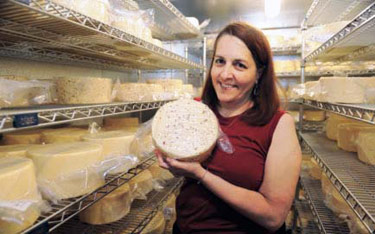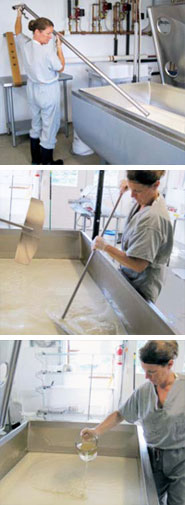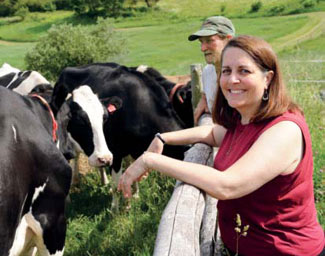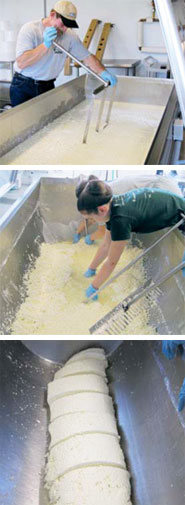
Linda Simon Miller '78 and her husband, George, have made their Jericho Hill Farm in Vermont an award winning cheese and maple syrup enterprise.
If you ever want to see old-fashioned American values—the kind that include working hard to produce something of worth on a piece of land that is a little piece of paradise—then pay a visit to Linda and George Miller's 135-acre Jericho Hill Farm in White River Junction, Vt. Surrounded by dairy cows and lush meadows, grand old maple trees and whispering pines, the Millers have perpetuated a lifestyle and created a business through resilience and resourcefulness that brings them to the end of each day bone weary and deeply fulfilled.
Linda, a gregarious, upbeat woman never lived too far from White River Junction. George is her high school sweetheart— they've been married 30 years and have a son and a daughter—and it never entered her mind to leave him to go on to higher learning. Her mother suggested she could stay close to home (George) and continue her education if she enrolled in “that great little college down the road in New Hampshire.” That's what Linda did, and as she says, “I loved Colby-Sawyer. I received a secretarial sciences associate degree. I had two roommates there who are still very dear friends: Diane Guilbault DeBiasi '79 and Jane Venie Earls '79. We get together whenever we can.”

Immediately after graduation from Colby-Sawyer, Linda landed a job at Dartmouth-Hitchcock Medical Center (DHMC) in the Department of Pediatrics. After 30 years in pediatrics, and with a recently acquired master's degree in management, she changed jobs within DHMC and now works as an information services specialist in General Ambulatory Services. “What that means,” Linda says, “is that, along with my staff, I'm managing four systems, including the outpatient scheduling system, the patient communication system.” Then, in addition to her work at DHMC, there is the farm.
Jericho Hill Farm has been in her husband's family since 1907, when George's great grandfather, George Nelson Miller, walked up Jericho Hill from the train depot in White River Junction and bought the property with a handshake and $1,800 he had sewn in the lining of his jacket. In 1955 the family bought a second property, Jericho ValVu (75 acres), close to the first.
Just before his high school graduation in 1976, George and his childhood friend began a maple syrup partnership known as Scattered Maples. In 1994 Scattered Maples was the winner of the Vermont Maplerama “World's Best Maple Syrup” Award, a huge honor in the syrup industry.
In explaining how the cheese-making facet of their business began, Linda says, “It costs us about $17 to produce a hundred pounds of milk—approximately 12 gallons—( dairy farmers measure by hundredweight, not gallons). In 2006 we were getting only $11 per hundredweight, losing a good piece of money on every sale. I think Vermont lost close to 300 farms that year.”
It was at this point that George decided they couldn't go on under those conditions, and this is where the family resourcefulness and resilience comes in. His solution was to turn the milk into cheese, which was selling at $125 per hundredweight. The logical question would be: why wouldn't all dairy farmers do this? The answer is complicated: building a cheese-making facility is expensive; it takes 1,000 pounds of milk to make 100 pounds of cheese; and making cheese at the small-farm level is a complex and arduous endeavor. Still, once they ran the numbers, the idea made financial sense. Undaunted by the difficulty of what they were attempting, and with help from friends and family—one was a logger, one had a portable sawmill, one had planing equipment, and one was a carpenter— George busted his tail and built his cheese-making facility, with addional help from his son, Alex, and his friends. Now, George, Linda, and various family members they have hired keep it running as smooth as the cheese they make.

The Millers' workday starts at 5:30 a.m. with breakfast together. Linda returns from DHMC many days at 8 p.m., in time to have dinner with George, whose workday ends at 8:30 p.m. However, he does get most Saturday nights off, which means he works only until 6:30 p.m. While the Millers have traveled on rare occasions to places like Europe and to Minn., N.Y. and Mass. to visit family, it takes a ton of planning and a whole bunch of people to cover for them because their dairy herd of 60 cows needs to be milked twice a day. A Holstein will deliver between 75 and 100 pounds of milk a day, although they had one that produced 130 pounds per day, a little more than 16 gallons. Linda sometimes helps George with the milking. Her job is to wash the cows off. George follows her, hooking the cows up to the milking machines. The whole process takes about two and a half hours each time.
Washing the cows is all about cleanliness, which seems to be the number one priority for the Millers in all aspects of their business. Anyone entering the cheese making facility must take off their shoes and wear a hat or hair net—no exceptions. Why so picky? Other than pride and product purity, the Millers have a reputation to uphold. In 1994 their farm received the State of Vermont Top Quality Award for Pasteurized Milk Counts. They won the Highest Milk Quality Award in both 1995 and 1999. In 2006 they received a second place Quality Milk Award in Agri- Mark Region Nine, which is a large region. They have received high quality milk awards from Cabot Creamery every year since 1976. In addition, the Millers also received the Ottauquechee Conservation District Farm of the Year Award in 1996 for conservation practices.

When they're producing cheese, the Millers make it every third day. For each “make” they use the milk from seven cows, turning 1,000 pounds of milk into about 100 pounds of Colby Cheddar and Jericho Jack cheese, which they also make into smoked, pepper, and caraway varieties. With the curds removed, the byproduct is 900 pounds of whey that is given to a local farmer to feed his herd of pigs. The cheese-making equipment is mostly stainless steel, polished to mirror brilliance.
The process for making cheese is complex, time consuming, and involves a great deal of science. It requires carefully controlled temperatures and measurements, the precise addition of cultures and enzymes, and lots of stirring by hand to reach the proper point of flocculation. Then, there is the cutting of the flocculated curd, the draining of the whey, and the preparation of the curds for the cheese molds. All of these steps must take place in the exact right amount and at an exact time in the process. “Above all,” Linda says, “everything must be kept clean.”
The end product is shaped, cut, packaged and placed in the Millers' large refrigerator room. Later it will be distributed to country stores and food co-ops like the popular one that serves the Lebanon and Hanover, N.H. areas. Linda will also sell Jericho Hill Farm cheese at farmers' markets— there's a big one in Norwich, Vt. that she attends every Saturday from May through Oct. It attracts hundreds of people who, for reasons of the ecology or the economy, understand the value and the importance of buying locally and supporting local farmers.
Okay, so Linda and George and their relatives work very hard to make their cheese, but how good is it? If you've ever had a meal in a high-end restaurant where you could tell the food was top quality because it was perfectly prepared and had a clean, pure taste, Jericho Hill Farm cheese is like that. The consistency is likely as smooth or smoother than any cheese you've ever let melt in your mouth, and the taste itself is exquisite. There's not a cracker in existence that wouldn't be greatly enhanced if topped off by a generous slab of Jericho Hill Farm cheese. It's that good.
Jericho Hill Farm is a beautiful piece of land with breathtaking views. It's a piece of land that would start developers salivating and the money flowing. However, none of this is of interest to Linda and George. Their dream is that the acreage will always be in the family. There are warm summer evenings when they sit on their front porch and watch the purple fade from the twilight. The cows low softly in the pasture, the crickets sing, the sweet scent of the meadows wafts around them, and stars begin to dot the sky. As Linda says, “This lifestyle is a lot of work, but it's just wonderful. There's really nothing better for me. I feel we're lucky to be the stewards of this land.” Since 1907, when George Nelson Miller walked up Jericho Hill with his $1,800 stash, the Miller family has been the best stewards Mother Nature could have entrusted with this little piece of paradise.
To learn more about Jericho Hill Farm and how you can visit, go to: www.vtcheese.com/members/jericho/jericho.htm
-David R. Morcom


